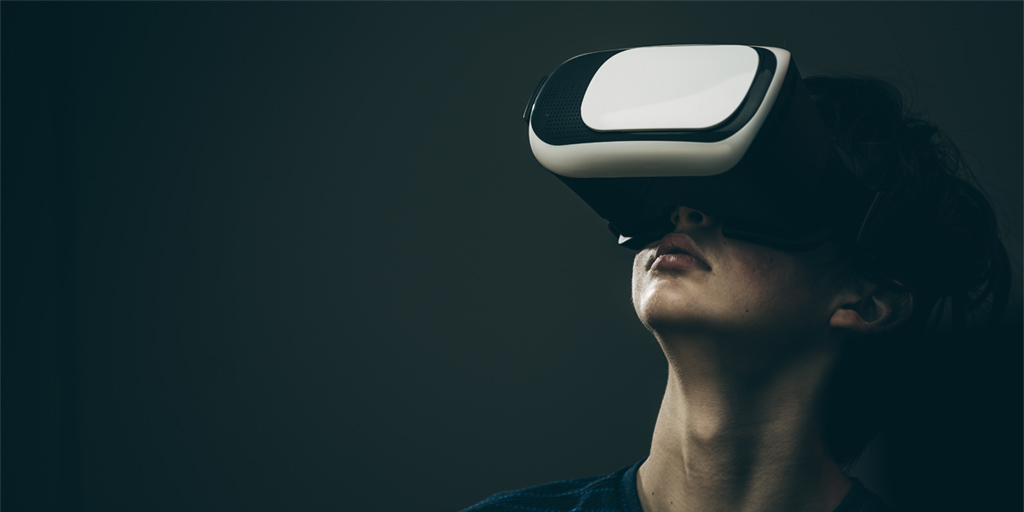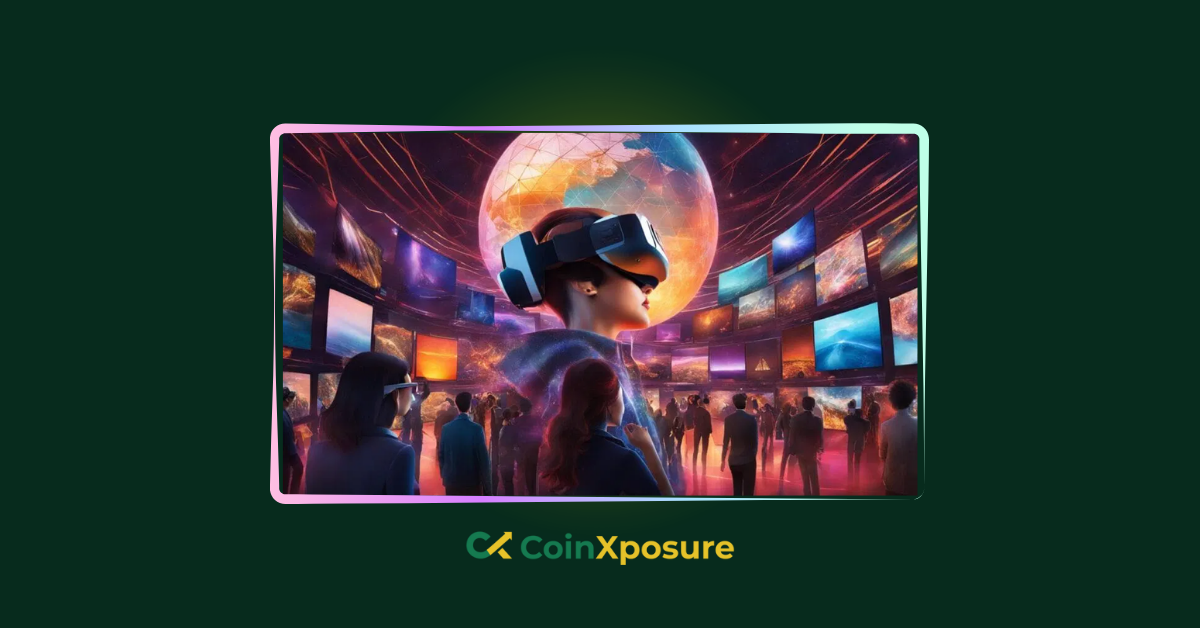Building confidence in the platform is one of the most challenging tasks to overcome, as with any new technology. Users must believe that their communications and financial transactions are trustworthy, private, and secure. Increase confidence in VR platforms; blockchain technology has enormous potential. Users may feel secure, private, and able to trust the platform due to blockchain’s decentralized, transparent, and immutable nature.
In this article, we will investigate how blockchain technology might be used in VR platforms to foster trust, meet problems, and seize opportunities. We’ll look at examples of blockchain technology being used successfully in VR platforms and advocate for more research into and use blockchain technology in this field.
Blockchain and VR Platforms
Blockchain technology is a distributed, decentralized ledger that enables safe and open transactions. Although initially created for use in cryptocurrencies like Bitcoin, it has subsequently found applications in many other fields, including VR platforms.
People may interact with computer-generated landscapes on VR platforms through a VR headset. These platforms are increasingly well-liked for social networking, gaming, and instructional uses. However, because consumers are concerned about security, privacy, and dependability, these platforms have difficulty earning their confidence.
These issues can be solved by incorporating blockchain technology into VR systems. Because blockchain is decentralized, there is no single point of failure, which makes it challenging for hackers to attack the system. Additionally, the transparency and immutability of blockchain ensure that transactions are recorded and cannot be changed or erased, giving users confidence.
The user experience may be improved using special features that blockchain technology offers. For instance, VR platforms can automate interactions and transactions using smart contracts, self-executing contracts in which the buyer and seller’s agreement details are directly encoded into lines of code. This can simplify the procedure, lower expenses, and boost productivity.
Blockchain technology can overcome the difficulties VR systems experience in establishing consumer confidence. Users may feel secure and reliable due to its decentralized, transparent, and unchangeable nature, offering unique features that improve the user experience.
Building Trust in VR Platforms with Blockchain
Blockchain technology may be applied several ways to increase trust in VR platforms. These include decentralization, the usage of smart contracts, security and privacy, verification and authentication, transparency, traceability, and transparency traceability.
Blockchain-based identification systems may be used to achieve verification and authentication. These systems can safely and consistently confirm a user’s identification to make sure they are who they claim to be. This can lessen the chance of identity theft and assist in avoiding fraud.
Blockchain technology may also offer essential benefits like transparency and traceability. All parties may examine and follow the history of transactions on the blockchain since it is transparent. This can aid in preventing fraud and foster user confidence in the platform.
Building trust in VR platforms also requires considering security and privacy concerns. Through the use of robust cryptography and encryption, blockchain technology may offer transactions that are private and safe. Furthermore, the decentralized structure of blockchain makes it challenging for hackers to infiltrate the network, giving consumers a sense of security.
Another critical feature of blockchain technology that may be utilized to increase confidence in VR platforms is decentralization. Since there is no single point of failure, thanks to devolution, it is more difficult for hackers to attack the system. This can lessen downtime and guarantee that users can always use the platform.
Blockchain technology may also increase confidence in VR platforms through intelligent contracts. Self-executing contracts, or smart contracts, automatically enforce the terms of the parties’ agreement. Automating transactions and conversations can lower the risk of fraud and boost productivity.
There are numerous strategies to increase confidence in VR platforms using blockchain technology. Blockchain technology may help guarantee that users have confidence and security in the platform through verification and authentication, transparency and traceability, security and privacy, decentralization, and the usage of smart contracts.
Importance of Trust in VR Platforms
The success of any platform, including VR platforms, depends on user trust. Users must have confidence that their communications and financial transactions are trustworthy, private, and secure. Users may be reluctant to utilize the platform without faith, which might result in poor adoption rates and decreased engagement.
Trust is crucial in VR platforms because users frequently engage in real-time virtual interactions with other users. Users must know that their interactions are secure and that their private data is confidential. Users must also believe that their virtual assets, like virtual money or virtual products, are safe and cannot be taken advantage of or lost.
Building user confidence in VR platforms is also essential for the platform’s long-term viability. Users are more inclined to utilize the platform if they believe their interactions and transactions are safe and dependable, which can improve user engagement. Additionally, as happy users are more likely to refer the platform to others, trust can result in favorable word-of-mouth.
In conclusion, trust is crucial for VR platform success. Users may be reluctant to utilize the platform without faith, which might result in poor adoption rates and decreased engagement. Building user involvement and favorable word-of-mouth through VR platforms can help the platform succeed over the long run.
Overcoming Challenges
When using blockchain technology to establish trust in VR platforms, various obstacles must be solved. Scalability, interoperability, education and acceptance, and regulatory compliance are some of these difficulties.
Since blockchain technology is still in its infancy, scalability presents a considerable hurdle. Blockchain technology may be resource- and time-consuming, making it challenging to expand to meet the needs of a broad user base.
Blockchain developers are developing fresh approaches to this problem, such as sharding, off-chain transactions, and layer two solutions that can speed up transactions and cut costs.
Another difficulty with incorporating blockchain technology into VR systems is interoperability. There are several different blockchain systems and protocols, each with unique attributes. Standards for interoperability are required to ensure that various blockchain platforms can communicate, enabling smooth transactions and interactions.
When establishing confidence in VR platforms with blockchain technology, education and acceptance are significant obstacles that must be addressed. Due to blockchain technology’s complexity and relative newness, many people may not completely comprehend how it operates or how to use it. Education programs are required to assist people in understanding the advantages of blockchain technology and how to utilize it efficiently.
Finally, when incorporating blockchain technology into VR systems, regulatory compliance is a crucial factor. In many places, blockchain technology runs in legal and regulatory limbo, and restrictions can differ significantly from one nation to another.
To overcome this difficulty, VR platforms must collaborate with regulators and legal professionals to guarantee that they are compatible with local laws and regulations.
As a result, although there are several difficulties to solve when establishing confidence in VR platforms using blockchain technology, solutions are being created to handle these difficulties. When incorporating blockchain technology into VR platforms, it’s vital to consider factors like scalability, interoperability, education and adoption, and regulatory compliance.
Embracing Opportunities
Despite the difficulties, there are several chances to seize while establishing confidence in VR platforms using blockchain technology. These possibilities include better user experiences, user engagement, new business models, and security and privacy.
Increasing security and anonymity is one of the most significant advantages of incorporating blockchain technology into VR systems. Blockchain technology offers individuals a private and secure means of communication and exchange. VR platforms may gain users’ confidence and create a more intimate and safe environment for interactions by utilizing the power of blockchain.
The development of fresh business concepts is another chance. Blockchain technology makes it possible for new modes of value exchange, such as tokenization, which might lead to new VR platform business models and sources of income. VR platforms can, for instance, design virtual money that can be used for in-game purchases or other types of transactions.
Another benefit that may be attained through blockchain technology in VR platforms is increased user engagement. Blockchain-based incentives and prizes can motivate users to interact with the platform more, fostering a livelier and more engaged user base.
Finally, blockchain technology can help VR platforms provide a better user experience. Numerous platform functions may be automated using smart contracts and other blockchain-based technologies, lowering friction and enhancing user experience. Additionally, users of various platforms and apps may benefit from a more smooth and more integrated experience thanks to blockchain-based solutions.
In conclusion, incorporating blockchain technology into VR systems allows for better user experiences, new business models, and higher security and privacy. By seizing these chances, VR platforms can increase user confidence and foster a more active and prosperous environment.
Case Studies
Several VR platforms have actively used blockchain technology to foster user confidence. Some case studies are shown below:
- Decentraland
- Somnium Space
- Cryptovoxels
Decentraland
Decentraland is a decentralized virtual environment where users may produce, consume, and make money from their apps and content. The platform uses blockchain technology to provide a trustless ownership mechanism for virtual real estate and other assets. MANA, the platform’s virtual currency, is tradeable on several cryptocurrency exchanges and may be used for in-game purchases.
Somnium Space
Somnium Space is a social virtual reality platform that enables users to discover, produce, and make money from their virtual experiences. The platform uses blockchain technology to offer decentralized ownership of virtual goods and property and safe and private transactions. Somnium Space also employs its cryptocurrency, dubbed CUBE, for in-game transactions.
Cryptovoxels
In the virtual world of Cryptovoxels, people may purchase, construct, and explore their digital land plots. The platform uses blockchain technology to offer decentralized ownership of virtual goods and land and safe and transparent transactions. Voxels, the platform’s virtual money, may be traded on various cryptocurrency exchanges and used for in-game purchases.
By offering safe and private transactions, decentralized ownership systems, and novel forms of value exchange, the inclusion of blockchain technology has enhanced user confidence in each of these scenarios. Through in-game purchases and virtual currencies based on blockchain technology, these VR platforms are also developing new business models and income sources.
Conclusion
A safe and private environment for transactions, decentralized ownership systems, and novel forms of value exchange are all features of blockchain technology that can potentially transform how VR platforms function.
When integrating blockchain technology into VR platforms, many opportunities must be embraced, including increased security and privacy, new business models, increased user engagement, and improved user experiences. This is true despite scalability, interoperability, education and adoption, and regulatory compliance challenges.
Several VR platforms, including Decentraland, Somnium Space, and Cryptovoxels, have successfully used blockchain technology. These platforms use blockchain to establish trust with their users and provide new ways to trade value.
As blockchain technology develops and matures, we’ll probably witness even more innovation in the VR industry as developers use its capabilities to design fresh, engaging user experiences. Ultimately, using blockchain technology in VR platforms can change how we engage with virtual reality, resulting in a safer, more open, and more fun experience for consumers.












